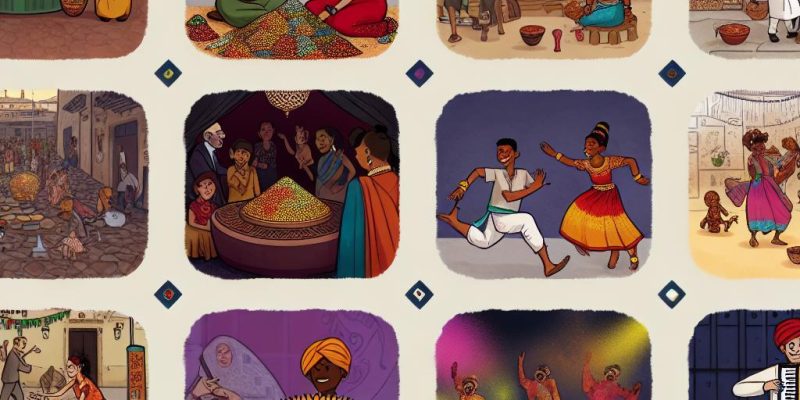Your Ultimate Guide to Authentic Travel Experiences in 2025
In a world where mass tourism often dilutes authentic cultural experiences, savvy travelers are increasingly seeking genuine connections with local communities. This comprehensive guide unveils 15 extraordinary destinations where you can dive deep into living traditions, ancient customs, and authentic daily life. Let’s explore these cultural havens that promise transformative experiences beyond the typical tourist trail.
Why Traditional Tourism No Longer Cuts It
Recent studies show that 76% of modern travelers prioritize authentic cultural experiences over standard sightseeing. This shift reflects a growing desire to understand and participate in local traditions rather than merely observing them from a distance. Our carefully curated list addresses this evolving travel trend, offering destinations where cultural immersion isn’t just possible – it’s inevitable.
15 Destinations for Genuine Cultural Connection
- Ladakh, India. Hidden in the Himalayas, Ladakh offers more than just stunning landscapes. Here, you can live with Buddhist monks in ancient monasteries, participating in morning prayers and learning traditional meditation techniques. Local homestay programs let you experience the unique Ladakhi way of life, from farming at 11,000 feet to preparing traditional butter tea.
- Svaneti, Georgia. This remote mountain region preserves centuries-old Georgian traditions. Stay with Svan families in medieval tower houses, learn polyphonic singing, and help prepare traditional khachapuri bread. The region’s isolation has preserved customs that have vanished elsewhere.
- Luang Prabang, LaosWake before dawn to participate in the daily alms-giving ceremony with local monks. Join cooking classes in family homes, learn traditional weaving techniques, and experience Baci ceremonies that have remained unchanged for generations.
- Matera, ItalyIn. This ancient cave-dwelling city, stay in restored sassi (cave houses) and learn traditional bread-making methods passed down through generations. Local families teach age-old pottery techniques using clay from nearby ravines.
- BhutanIn this Himalayan kingdom, immerse yourself in the philosophy of Gross National Happiness. Stay in traditional farmhouses, learn archery from local masters, and participate in tsechus (religious festivals). Unique opportunity: Join monks for meditation sessions in 17th-century dzongs (fortresses).
- Oaxaca, Mexico. Diveinto Mexico’srichest cultural tapestry. Work alongside artisans in their family workshops, learning alebrije (folk art sculpture) painting and black clay pottery. Experience traditional temazcal (sweat lodge) ceremonies and help harvest agave for mezcal production.
- Kyoto’s Rural Outskirts, Japan. Beyond the famous temples, stay in centuries-old minkas (traditional houses) in rural villages. Learn the art of traditional papermaking, participate in tea ceremonies, and assist local farmers during rice planting season. Special access to private gardens and lesser-known temples provides intimate glimpses into Japanese culture.
- Fez Medina, Morocco. Live with local families in traditional riads, learning the art of tadlakt (waterproof plaster) and zellige (mosaic tilework). Apprentice with master craftsmen in the world’s largest car-free urban area, where medieval trading traditions remain alive. Join families for dawn bread-making sessions at community ovens.
- Varanasi, India Experience the world’s oldest continuously inhabited city through its spiritual practices. Learn classical Indian music from hereditary musicians, practice yoga with traditional gurus, and participate in evening aarti ceremonies along the Ganges. Stay with Brahmin families to understand ancient Vedic traditions.
- Cappadocia Villages, Turkey. Beyond the famous balloon rides, live in restored cave houses in lesser-known villages. Learn traditional carpet weaving from local women, help prepare annual grape harvests, and discover the art of making gözleme (traditional flatbread) in village homes.
- Sapa Highlands, Vietnam. Live with H’mong families in traditional stilt houses, learning indigo dyeing and hemp weaving techniques passed down through generations. Participate in rice planting, buffalo tending, and traditional medicine gathering in the mountains.
- Salvador, Brazil. Immerse yourself in Afro-Brazilian culture through candomblé ceremonies, capoeira classes with local masters, and traditional cooking workshops. Stay with local families in the historic Pelourinho district to experience daily life beyond the tourist facade.
- Transylvanian Villages, Romania. Experience medieval European life in preserved Saxon villages. Stay with shepherds in remote mountain camps, learn traditional cheese-making methods, and participate in seasonal festivals that pre-date Christianity. Help restore centuries-old fortified churches alongside local craftsmen.
- Kerala Backwaters, India. Live with families in traditional tharavads (ancestral homes), learning the ancient martial art of Kalaripayattu and Kathakali dance. Participate in ayurvedic medicine preparation and help navigate traditional houseboats through remote canals.
- Venda Region, South Africa. Stay with local families in traditional roundhouses, learning ancient pottery techniques and participating in initiation ceremonies (when permitted). Work with community storytellers to preserve oral histories and learn traditional drumming patterns used for communication between villages.
Making the Most of Cultural Immersion
To truly benefit from these experiences:
- Learn basic phrases in the local language
- Stay minimum of 5-7 days in each location
- Participate in daily household activities
- Attend local festivals and celebrations
- Connect with community elders
The Impact of Responsible Cultural Tourism
When done right, cultural immersion tourism supports local communities while preserving traditions. Statistics show that 85% of revenue from homestay programs directly benefits local families, compared to just 30% from traditional hotel stays.
Practical Considerations
Before embarking on your cultural journey:
- Research local customs and taboos
- Pack appropriate clothing
- Arrange necessary permits early
- Connect with local guides and families
- Bring meaningful gifts from your culture
Conclusion
These 15 destinations offer more than just a glimpse into different cultures – they provide transformative experiences that challenge perspectives and create lasting connections. As mass tourism continues to evolve, these authentic encounters become increasingly precious. Don’t wait to plan your cultural immersion journey; some traditions face the risk of disappearing within our lifetime.

